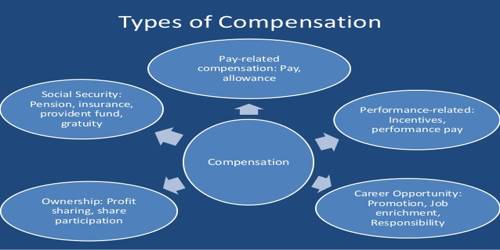Types of Compensation
Compensation means the basic returns that an employee obtains from his/her work. Every organization offers a good compensation to attract and retain the ablest employees on the actual work floor. It is because if the company does not offer an attractive package of compensation, compared to other competitive firms, the efficient employees may leave the firm.
Compensation is a package of salaries and wages, pay incentives and benefits that an employee receives as remuneration for rendering services to the organization. Different types of compensation include; Base Pay, Commissions, Overtime Pay, Bonuses, Profit Sharing, Merit Pay, Stock Options, Travel/Meal/Housing Allowance etc. Benefits including; dental, insurance, medical, vacation, leaves, retirement, taxes etc.
Depending upon the nature and mode of compensation, it can be categorized into two dimensions as follows:
Financial Benefits
The financial benefits consist such payments which are paid in terms of monetary gains. They enhance the economic well-being of the employees. Financial payments can either be direct or indirect.
- Direct Payments: Direct payments consist of wages, salaries, bonuses, commissions, and other direct forms of payments.
- Indirect Payments: Indirect payments consist of insurance, social benefits, allowances, employee services, holidays etc.
Non-Financial Benefits
The non-financial benefits include everything in a work environment which are not expressed in monetary units. They help to enhance a worker’s sense of self-respect and sense of being accomplished. The ideas under it are shown as:
- Work Benefits: Work benefits consist of challenging job, responsibility, accountability, feeling of achievement and so forth.
- Environment Benefits: Environment benefits consist of appropriate policy, adequate supervision, co-worker’s status, interesting job, appropriate timing, and the like.
The total compensation offered to an employee may be broken down into direct, indirect and intangible compensation. Direct compensation involves monetary payments to employees for time worked or results obtained. Indirect compensation involves expenditures made by an employer on behalf of all employees and is typically referred to as “fringe benefits.” Intangible compensation involves non-monetary rewards such as;
Direct Compensation Components
- Base salary
- Premium payments (overtime, shift differentials, longevity pay.)
- Contingent programs (incentive plans or achievement award, merit pay)
Indirect Compensation Components
- Protection programs (Social Security, Worker’s Compensation, Unemployment Compensation, pension plans, health, dental, vision, life, accidental death and long-term disability insurance.)
- Paid Leave (vacations, holidays, jury duty, sick leave, military leave.)
Information Source:
















